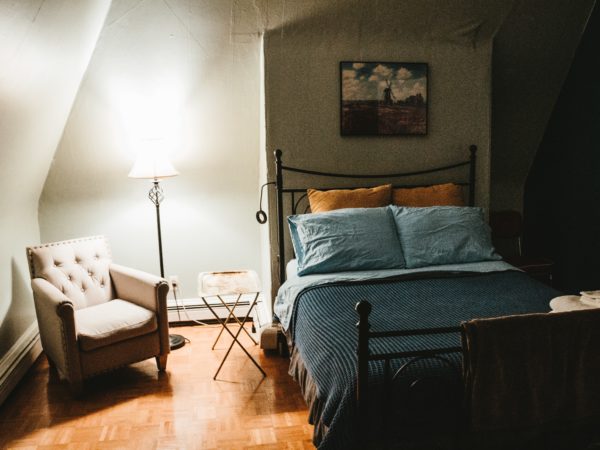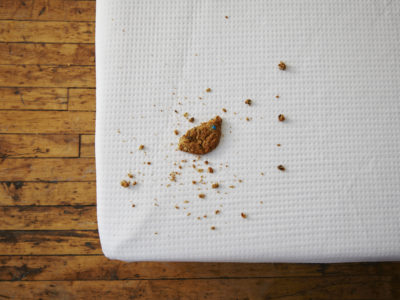How often you replace your mattress depends on a variety of factors, including how often you sleep on it, how much you weigh, and how well you care for it. However, a typical mattress tends to last between 7 and 10 years.
How long your mattress lasts also depends on the type of materials used. American-made hybrid mattresses with superior craftsmanship last longer than most others. It also helps to place your mattress on a foundation such as a box spring or mattress foundation, which helps extend its longevity.
People who have quality mattresses tend to get better sleep so it’s important to evaluate whether your mattress is in good condition or if it needs to be replaced soon.
Learn how often you should replace your mattress for better health.
Factors To Consider When Evaluating Your Old Mattress
It takes a discerning eye to find out how often to replace a mattress. If you’re deciding when to get a new mattress, we’ve listed some of the top evaluation factors below.
1. The Age of Your Mattress
Mattresses rarely hold up after 10 years of use. If your mattress is approaching its 10th birthday, it’s probably past-due for a replacement. However, even mattresses that are five years old can sometimes be due for an upgrade. So you don’t have to hold onto your old mattress for a decade if you’re noticing that a good night’s sleep is hard to come by.
2. Heavy Sagging
Press your hands into the center of your mattress. If you notice that it is sagging, even mildly, then it’s time to consider upgrading. Even small indentations and light mattress sagging can cause long-term back pain. The life of your mattress can depend on the integrity of the sleep surface, so it’s important to check in on this from time to time.
3. Regular Back Pain
If you’re waking up with a sore back or achy muscles, it’s probably time you ditch your old mattress and invest in one that will support your back’s natural curvature. Your sleep position and mattress can play into this as well. For example, using an extremely firm mattress can cause some of this pain for side sleepers.
4. Allergies Getting Worse
Old mattresses accumulate potentially harmful contaminants such as dead skin cells, allergens or dust mites, mildew, and other bacteria. Cleaning your mattress by hand and vacuuming may be able to help get rid of these build-up issues and improve your allergy symptoms.
5. Sleep Quality Dipping
Waking up feeling restless and tired? Consistently poor sleep quality is a dead giveaway that it’s time to ditch your old ratty sleeping surface and invest in a quality mattress.
6. Other Signs of Wear
Is your mattress showing signs of wear, such as rips, tears, stains, and other unsightly damage? If so, it might be time to purchase a replacement.
Different Types of Mattresses Have Different Lifespans
Not all mattresses are created equally. Below, we’ve listed the most popular mattress types and how long they tend to last.
Memory Foam Mattresses
The average memory foam mattress lasts roughly 7 to 10 years.
Innerspring Mattresses
Innerspring mattresses typically last between 5 and 10 years depending on the frequency of use and the user’s body weight.
Hybrid Mattresses
Quality hybrid mattresses, such as those manufactured by Helix Sleep, last approximately 10 years. Helix hybrid mattresses are made from a combination of Memory Plus Foam, Helix Dynamic Foam and wrapped coils.
Learn more about the Helix Difference.
Latex Mattresses
Durable mattresses made of organic latex last over 10 years because of their firmer, high-density surface.
Cooling Gel Mattresses
Gel-infused mattresses benefit from superior longevity. The average cooling gel mattress lasts between 8 and 12 years.
Futons
Futon mattresses tend to be thinner than regular mattresses and cheaply made. These mattresses last between 6 and 8 years on average.
Do You Just Need A New Mattress Protector?
Is your mattress showing signs of wear and tear? If so, you may be wondering whether you should buy a mattress protector, or invest in a brand new mattress.
If you notice any of the following warning signs, then it’s probably too late for a mattress protector:
- Rips and tears appear along the edges
- Dark stains are impossible to remove
- The sleeping surface sags
- The mattress has a strong, unpleasant smell
What About Your Bed Frame, Foundation or Box Spring?
If you’re asking yourself how often you should buy a new mattress, you might also be wondering about your bed frame or box spring. Sometimes, your mattress isn’t the cause of the problem.
Before you ask how often to replace the mattress or how often to change the mattress, check your box spring to see if there are any plank breaks or structural sagging.
If so, you may need to replace your box spring before your mattress. After replacing your box spring or foundation, then you can ask how often a mattress should be replaced.
Thinking About A New Mattress?
This article addressed the age-old question, “how often should I replace my mattress?” Whether you’re due for an upgrade now or are thinking about replacing your mattress sometime in the future, consider a Helix mattress. Our American-made Helix mattresses are custom-made to suit your body’s unique needs. Take the Helix Sleep Quiz today to find the perfect mattress for your sleep style and personal preferences.

















